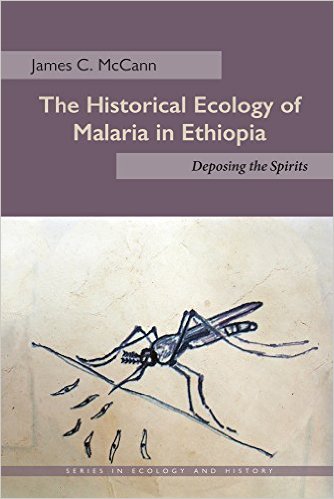
James McCann’s newest book on malaria, agriculture, and ecology in Ethiopia is a superb and rich study. McCann helps fill many gaps in scholarship, including the grossly overlooked history of medicine in Ethiopia. The book narrates malaria in Ethiopia in both the past and present, demonstrating how this ever-evolving, clever disease has shifted with the ecological and political landscape of the nation. To understand malaria today, McCann rightly demonstrates how an exploration of the past is essential. Unfortunately, there is very little written about Ethiopia’s medical history – Kloos and Zein’s Ecology of Health and Disease in Ethiopia (1993) is the most useful volume in an otherwise bleak academic landscape. McCann’s new study is a welcome start to what should be an expansion of research on past efforts to combat disease and install an effective public health network in the country. Because of Ethiopia’s unique ecological and political character – a highland nation, free of a colonial past – the challenges faced are unique in comparison to other African states. McCann’s rigorous exploration of Ethiopia’s ecological and agricultural histories, both in this and previous books, provides refreshing insights into this singular landscape.
While this study is especially insightful for scholars of Ethiopia, it also provides a rigorous exploration of the failures to account for local ecology in the planning of disease management and control. This is a lesson worth exporting far outside both Ethiopia and even the specific case of malaria. McCann repeats often in the book how malaria is a deeply ‘local’ disease: the ways in which mosquitos breed and prey on human populations varies considerably based on ecological and political landscapes. While malaria ‘eradication’ efforts in the past century have been forged on a global scale, most notably with DDT spraying and bed-nets, such efforts have all fallen severely short of their goals, largely because of the highly adaptive nature of the disease. There is no ‘one-size-fits-all’ approach to malaria eradication, and in some cases, the insertion of development programming itself can increase the risk of disease.
Indeed, one of the most striking findings in the book is the relationship between increased maize production and the spread of malaria. McCann describes how mosquitoes thrive off the seed fall of maize plants, leading to a dramatic increase of malaria risk in highland zones of Ethiopia that were previously largely immune to malaria due to altitude. Large-scale maize production has been touted by international organizations as an answer to hunger and poverty in Africa, but this clearly has dangerous unintended consequences to the ecology of disease.
McCann’s work is truly a must-read for experts in many fields, from public health, agriculture, and history, to politics and development. This book is a brilliant demonstration of the deeply local and highly adaptable nature of disease and mortality, and the ways in which the historical ecology of disease effects household decision-making and trends in food production and economic development on a national scale.
Book details: James C. McCann. The Historical Ecology of Malaria in Ethiopia. Ohio University Press (2015). http://www.amazon.com/Historical-Ecology-Malaria-Ethiopia-Deposing/dp/0821421476/ref=sr_1_1?s=books&ie=UTF8&qid=1449160837&sr=1-1&keywords=ecology+of+malaria+in+ethiopia
A review copy of The Historical Ecology of Malaria in Ethiopia was kindly furnished by the Ohio University Press.
